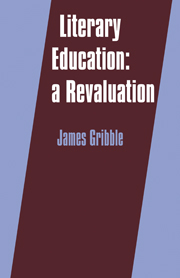Book contents
- Frontmatter
- Contents
- Acknowledgements
- Introduction Literature, life and education: some problems about how they relate to one another
- 1 Literature and truth
- 2 Literary criticism and literary education
- 3 Objectivity and subjectivity in literary education
- 4 The subordination of criticism to theory: structuralism and deconstructionism
- 5 Literature and the education of the emotions
- 6 Empathy and literary education
- 7 Literary intention and literary education
- 8 Literature, morality and censorship
- Notes
- Index
3 - Objectivity and subjectivity in literary education
Published online by Cambridge University Press: 01 June 2011
- Frontmatter
- Contents
- Acknowledgements
- Introduction Literature, life and education: some problems about how they relate to one another
- 1 Literature and truth
- 2 Literary criticism and literary education
- 3 Objectivity and subjectivity in literary education
- 4 The subordination of criticism to theory: structuralism and deconstructionism
- 5 Literature and the education of the emotions
- 6 Empathy and literary education
- 7 Literary intention and literary education
- 8 Literature, morality and censorship
- Notes
- Index
Summary
It is the mark of an educated mind to expect that amount of exactness in each kind which the nature of the particular subject admits. It is equally unreasonable to accept merely probable conclusions from a mathematician and to demand strict demonstration from an orator.
(Aristotle)It is not a simple matter to reply to the student who says, ‘Look, I can see all your reasons for saying that Shakespeare is better than James Bond but I like reading James Bond more than Shakespeare.’ The student may defend his preference by saying that James Bond is easier to read, identification with the hero is much simpler, it's more exciting, and so on. Many teachers find themselves in the rather embarrassing position of secretly sharing the student's preference for ‘a good read’ but feel obliged to press a case for Shakespeare which they may not strongly feel at all. This often produces in literature teachers a kind of guilt or a feeling of hypocrisy. After a hard day at school the teacher may well be disinclined to read Shakespeare – all he may want to do is ‘escape’ into James Bond or television.
There is, of course, nothing hypocritical about this. When we want to relax, or ‘turn off’, our most easily satisfied tastes and preferences are often quite naturally the dominant ones: the danger remains, however, that the teacher may develop a kind of cynicism about introducing students to great literature when he feels that much of the time he himself prefers the second- or thirdrate.
- Type
- Chapter
- Information
- Literary EducationA Revaluation, pp. 63 - 76Publisher: Cambridge University PressPrint publication year: 1983

